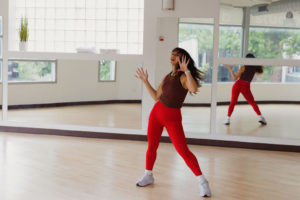
Part V: Yoga and Breathing
The word “yoga” is derived from a Sanskrit word meaning “union.” Union of what? Well, many things, but at the top of the list is “body and breath.” While breathing is incredibly important for all of the activities covered in this series, I dare say that proper breathing is most important in yoga if you want to maximize the benefits of your practice. Paying attention to your breath is a wonderful way to be more present; you aren’t thinking about the past and you aren’t planning for the future when your attention is purely on the breath you are taking in that moment – and that’s a good thing.
Ensuring that you keep breathing is also a great way to ensure you aren’t overexerting yourself. The poses you consider most challenging are also the ones you’re most likely to hold your breath because you’re so focused on the pose. Keep that air moving and your body will move more easily to where it needs to be.
How to: Your instructor may suggest a variety of options for your yoga class, but here are two basics to which you can default if no other instruction is given: equal breathing and ujjayi (eww-jai- eee) breathing. Equal breathing (which is also called sama vritti) means your inhale and exhale are of equal length. Whether 3, 10 or 30 seconds, the length of time you breathe in is the same as the time you breathe out.
Along with the other many benefits of breathing, this style calms your nervous system, lowers blood pressure, and reduces stress. Ujjayi breathing (also known as “victorious breath”) is the one that sounds a bit like Darth Vader. To make this sound, whether during yoga or a screening of The Force Awakens, slightly contract the back of your throat as you breath through your nose. It might feel a little funny, but it should not hurt! With either option, you should find your abdomen expands on the inhale and relaxes back in during your exhale. This means you’re fully filling your lungs, not just breathing only into your chest.
Sadly, as fundamental as breathing is, it could be that years of stress, allergy seasons, smoking, sucking in your tummy or other factors may leave you unaccustomed to breathing properly. If you find yourself short of breath or dizzy, take a break and return to what feels natural to you. Like the rest of your body, your lungs and the muscles you use to breath may simply need some practice and strength training.
Lastly, like everything else in yoga, notice your breathing without judgment. Just keep practicing and keep breathing – thankful for each breath you are lucky enough to take on this beautiful planet of ours.



